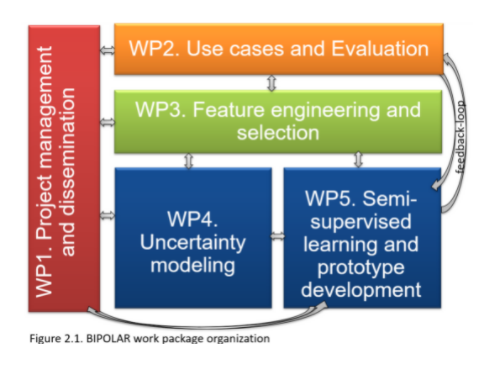Research
The concept. BIPOLAR will deliver an entirely novel, in its comprehensive character, predictive approach for bipolar disorder sensor-based monitoring. In order to reach its ambitious goals, BIPOLAR proposes a solid concept based on semi-supervision and uncertainty handling which consists of credible methodologies including fuzzy set theory and statistical process control. To achieve the aim and ambitious objectives of BIPOLAR, an international and interdisciplinary International Advisory Board (IAB) will be established to track the project progress on a quarterly basis and ensure complementarity of competences. The advisory board will be of an excellent track record within all the required subfields: sensor data processing and modeling (University of Bari, Warsaw University of Technology), uncertainty modeling (Systems Research Institute Polish Academy of Sciences), psychiatric and practical aspects of monitoring bipolar disorder using sensors in smartphones (Institute of Psychiatry and Neurology in Warsaw) and psychiatric and practical aspects of monitoring bipolar disorder using locomotor sensors (Department of Psychiatry and Medical Psychology in Sofia).
The proposed approach combines theoretical aspects of development of novel/improved approaches to learning from partially labeled sensor data in an dynamically changing and uncertain context of monitoring mental state of bipolar disorder patients with practical aspects of software engineering. The developed system prototype will be based on thorough requirements analysis that will be conducted to propose a comprehensive software module as an open source package. It will be verified experimentally in two use cases dealing with real-life sensor data from two studies that included bipolar disorder patients.
Work plan. The work of the project is divided into five work packages organized into three main groups:
I Predictive methods Development. Core technical R&D work of the project will be carried out in WP4 and WP5, in particular designing and development of the software prototype including fuzzy semi-supervised learning methods to capture uncertainties related to partially labeled data collected from sensors and imprecise psychiatric assessments with varying intensity of depressive and manic symptoms. WP5 starts with a thorough requirement analysis. Personalized approaches will be developed due to high variability between patients.
II Use case Evaluation and Feature engineering. This includes the development of the Use Cases for evaluation of results (WP2) and the closely related feature engineering and selection (WP3). WP2 starts with a thorough state of the art review. The delivered predictive methods and uncertainty handling models will be verified experimentally in two use cases dealing with real-life sensor data from two studies that included bipolar disorder patients. Scenarios of the Use Cases (S1-S5) will provide feedback to the technical development of the project (WP4-WP5).
III Project management and Outreach. WP1 provides general support for the other work packages. It includes the main outreach strategy, exploitation and dissemination. It also contains main project management and reporting tasks.
Under the following link is the BIPOLAR Repository on GitHub: https://github.com/ITPsychiatry/bipolar


